Kohlrabi /Helianthus tuberosus/ is a perennial herb that belongs to the Asteratsee family. In appearance, it greatly resembles a sunflower - stems reach a height of 3 meters, has a strong branch. The leaves are egg-shaped, pointed or rough with width up to 10 cm and 20 cm long. Sometimes the leaves are crushed under the action of its own weight. Colors of Jerusalem artichoke are colored bright yellow, reaching a diameter of 8 cm and blooming from August to November month.
It takes different names - German potato, earthy artichoke, Jerusalem artichoke, Indian roots, earth pear, artichoke, ground sunflower seeds, small sunflower, potato candy, kohlrabi, but the most famous is the Jerusalem artichokes. Jerusalem artichoke is wrongly named by the name of a tribe from Brazil, who visited Paris three years after the transfer of plants to Europe - around 1610.
Kohlrabi is from North and Central America /especially Mexico/. It is a cultural plant of the Indians, before the time of Columbus. Today, it is prevalent in almost all the continents of the world. Grown mostly in Russia, Asia, Australia and North America. In Europe, the Jerusalem artichoke has shifted from potato in the 18th century. However, it has two very important advantages for cultivation – no phytoflora and is not affected by the Colorado beetle, which as we know is the scourge of potatoes. Nowadays, the Jerusalem artichoke has an economic importance only in the Netherlands and parts of southern France.
Jerusalem artichoke tubers grow until November, then it's nice to be resolved as late as possible to allow time of nutrients from surface part to go in.
Composition of Jerusalem artichoke

Kohlrabi is extremely beneficial to health, a fact which is due to its rich content of a range of substances, as well as the high content of inulin. Inulin is a valuable natural polysaccharide, which consists of 95% fructose. Besides inulin, it contains many biologically active compounds - iron, zinc, fiber, silicon, magnesium, phosphorus, potassium, pectin, amino acids, organic acids, vitamins C and B. Kohlrabi is low calorie and is absorbed much better by the body.
100 grams of raw Jerusalem artichoke contains 73 calories, 17.4 g carbohydrates, 1.6 g dietary fiber, 0.1 mg vitamin B6, 4 mg vitamin C, 14 mg calcium, 17 mg magnesium, 13 mg folic acid, 0.1 mg manganese, 429 mg potassium, 78 mg phosphorus, 1.3 mg niacin, 0.2 mg thiamine.
Storage of Jerusalem artichoke
The collected tubers dry quickly if left open. They should be stored in a basement at temperatures around 0 degrees and 95% humidity. It is best to cover the tubers with soil or wet sand or place in a pile and covered with snow or dirt. The most effective way to store is for them to be removed from the earth in the fall and spring. Remove Jerusalem artichoke tubers in the spring, as they have a better taste. Furthermore, the yield of tubers is always greater in the spring because they do not grow until the ground freezes.
Jerusalem artichoke in cooking
Jerusalem artichoke can be eaten both raw and roasted or boiled. The tubers are slightly reminiscent of potatoes, although with a number of small growths, they are more likened to ginger root. The taste resembles a pear or artichokes.
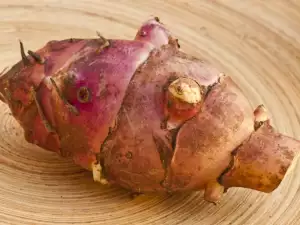
Tubers are very nutritious and do not need to be peeled before consumption. A good wash with clean water is required. As the Jerusalem artichoke is very uneven in structure, which allows the retention of soil and sand, be very careful and thoroughly wash it.
Jerusalem artichoke can be added to salads. Cooked and mashed tubers taste almost identical to potatoes. This determines the possibility of replacing potatoes with Jerusalem artichoke in many recipes.
In France, the tubers are a regular ingredient in salads. With them, you can make wonderful soups, creams and purees. Roasted Jerusalem artichoke with pork or chicken dish is irresistible. Jerusalem artichoke can be added to dishes with processed cheese, milk or cream. Jerusalem artichoke should not be overcooked, because it loses some of its properties.
Hot tea with slices of Jerusalem artichoke has almost the same taste as tea with lemon. Many tubers are often called "lemons of the north."
Benefits of Jerusalem artichoke
As it became clear, the tuber is produced in the winter or spring - the season in which the body needs more vitamins and nutrients. That's why, Jerusalem artichoke is becoming an important immune booster that has many nutrients. Unlike potatoes, Jerusalem artichoke has no starch and natural sugar.

Jerusalem artichokes are very suitable for people suffering from diabetes. Consumption of Jerusalem artichoke is favorable for patients with cardiovascular disease, gastrointestinal problems, high cholesterol, diabetes, obesity and various allergies, some immunodeficiency states, problems with hair and brittle nails.
Regular use of Jerusalem artichoke, and in particular the inulin contained therein helps to reduce the level of blood sugar and also improves insulin efficiency. Moreover, a decrease of cholesterol levels in the blood, reduces the risk of cardiovascular disease.
inulin helps the absorption of magnesium and calcium, which makes the plant an important means for preventing osteoporosis. Kohlrabi helps eliminate excess body weight, restores normal intestinal flora and inhibits the action of harmful intestinal microorganisms.
Tubers of Jerusalem artichoke serve as a means of purifying the blood and are extremely beneficial for the liver and kidneys. The plant helps in the removal of various contaminants.
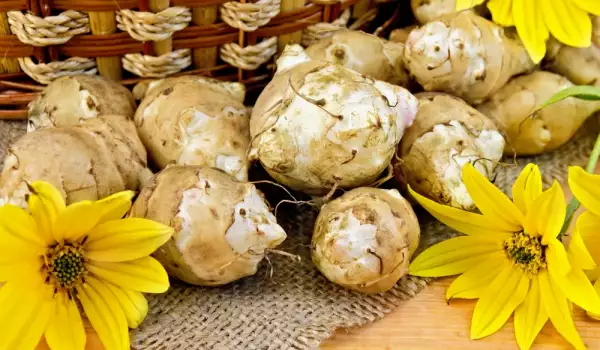
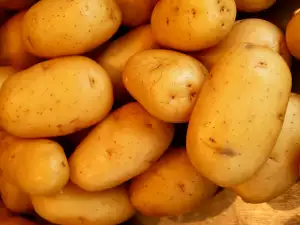
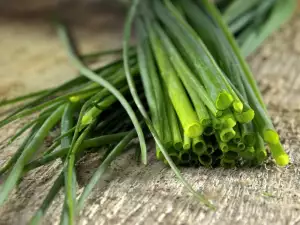



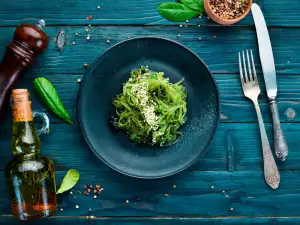
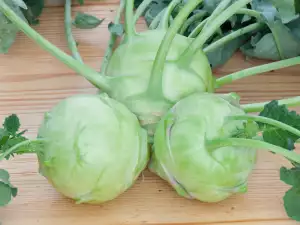
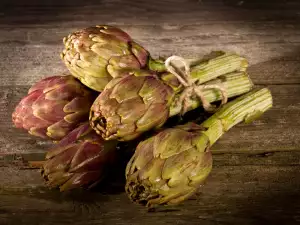




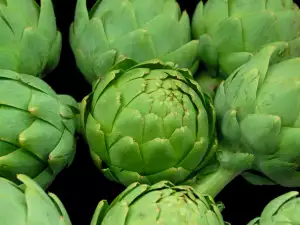




Comments